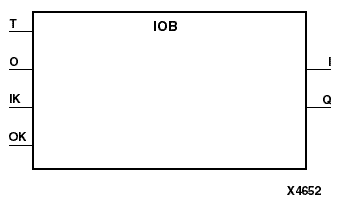|
|
|
|
|
|
| XC3000 | XC4000E | XC4000X | XC5200 | XC9000 | Spartan | SpartanXL | Spartan2 | Virtex |
|---|---|---|---|---|---|---|---|---|
| Primitive | N/A | N/A | N/A | N/A | N/A | N/A | N/A | N/A |

The IOB symbol is used to manually specify an IOB configuration. Use it in place of, not in conjunction with, other I/O primitives. The configuration of the IOB is specified using the BASE and CONFIG commands. Enter these commands on the schematic; the translator puts them into the CFG records in the LCA Xilinx netlist file. It is not necessary for the translator program to parse the commands specifying the IOB configuration. The mapping program from the LCA Xilinx netlist to the FPGA design checks these commands for errors.
Refer to the appropriate CAE tool interface user guide for more information on specifying the IOB configuration commands in a schematic.
The XC3000 blank IOB primitive symbol and its corresponding configured IOB primitive and circuit are shown in the “XC3000 IOB Primitive Example and Equivalent Circuit” figure.
The configuration commands must be consistent with the connections to the pins on the symbol. For example, if the configuration commands specify the IOB as a 3-state buffer, the T and O pins must be connected to signals.
You can specify the location of the IOB on the device. When specifying the LOC attribute, a valid IOB location name must be used. Refer to the “LOC” section of the “Attributes, Constraints, and Carry Logic” chapter for more information on the LOC attribute.